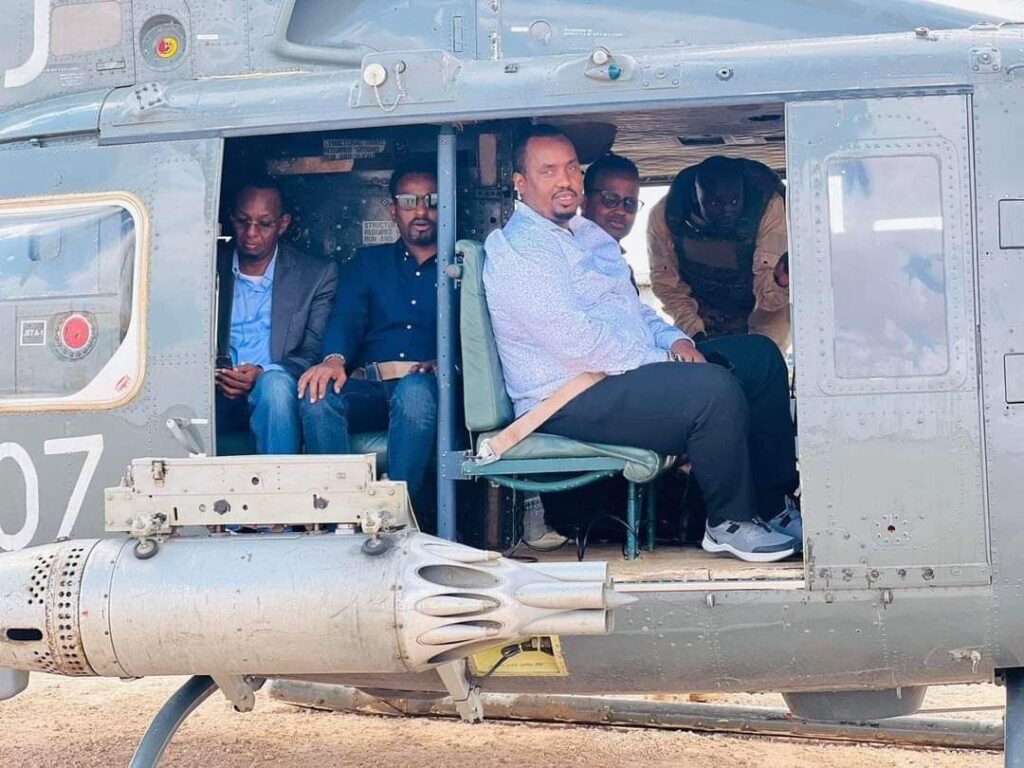Nomadicvoice, (Editorial) — The recent ambush of two trucks laden with weapons in Galgaduud, Somalia, underscores the deeply entrenched and perilous cycle of arms trafficking that plagues the region. These trucks, reportedly carrying thousands of firearms, were intercepted by the Marehan tribe, who now boastfully parade these weapons across social media. This incident is not merely a local skirmish but a stark emblem of the far-reaching and destabilizing effects of Somalia’s continued arms influx, facilitated by both internal actors and international negligence.
The weapons were allegedly bound for Liban Ahmed Hassan ‘Liban Shuluq,’ a political figure preparing to challenge incumbent Ahmed Abdi Karie ‘QoorQoor’ in Galmudug’s regional elections. The arms were intended to bolster militias combating Al-Shabaab, yet their capture by Marehan forces reveals the unpredictable nature of such transactions. With Somalia’s recent celebration of the lifting of the UN arms embargo, this debacle starkly highlights the fragility and corruption that undermine national security efforts.

Somalia’s government has repeatedly insisted on its capacity to reclaim these lost arms. However, history tells a different story. The federal authority’s lack of control and pervasive corruption within its ranks make such assurances ring hollow. The swift dissemination of these arms into clan militias and possibly even Al-Shabaab’s arsenal is a grim inevitability.
The broader implications are profound. The ease with which these arms were hijacked illustrates a sobering reality: Somalia remains a hotbed of arms trafficking, with the country now flooded with weapons from diverse sources, including Yemen and Iran. The Somali market is awash with firearms, as indicated by the plummeting prices of AK-47s in the wake of this incident. The regional destabilization wrought by these illicit flows cannot be overstated, threatening not only Somali security but also that of neighboring regions.
Internal Security Minister Abdullahi Sheikh Ismail ‘Fartaag’ has made a futile pilgrimage to the affected district, seeking to negotiate the return of the arms. The federal government’s promises to curb non-state actors’ weapon trade are undermined by its evident lack of enforcement capability. The hastily declared ban on arms trade is a performative act, as non-state actors have long operated with impunity.
The broader question looms: Can Somalia ever achieve disarmament? The near-universal possession of firearms, coupled with the steady influx of new weaponry, presents an insurmountable challenge. The government, plagued by perceptions of partiality and corruption, faces an uphill battle. Successive administrations have tried and failed to disarm militias, a task further complicated by deep-seated clan allegiances and the pervasive influence of warlords.
As Villa Somalia struggles to extricate itself from accusations of favoring certain clans and interests, the recent arms capture vividly underscores the ongoing violence and instability. Shuluq’s apparent readiness to use arms for political gain is symptomatic of the broader malaise affecting Somali politics.
The international community, having lifted the arms embargo, must now grapple with the unintended consequences of their decision. The infusion of high-end weaponry into a volatile environment only exacerbates the security dilemma. The UN and other stakeholders must reconsider their strategies, ensuring that support to Somalia is coupled with stringent oversight and accountability measures.
𝕯𝖗. 𝐗𝐈𝐃𝐃𝐈𝐆, Columnist and Security Expert for the Horn of Africa.
Discover more from Nomadicvoice
Subscribe to get the latest posts sent to your email.